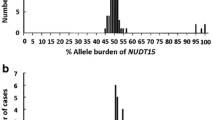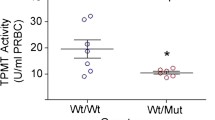Abstract
Background and objective
Individuals with intermediate or no thiopurine S-methyltransferase (TPMT) activity are at risk of hematotoxicity when treated with standard doses of thiopurines, thus, pretreatment identification of these individuals is of major importance. The purpose of this study was to determine the frequency and distribution of TPMT polymorphic variants, known to functionally impair TPMT activity, in the highly heterogeneous Israeli population.
Methods
TPMT genotyping of individuals representing three major demographic groups in Israel was carried out by PCR restriction fragment length polymorphism and high-resolution melting.
Results
Frequencies of TPMT risk alleles differed significantly among the screened Israeli subpopulations: Druze showed fivefold and twofold higher frequencies than Jews and Moslems, respectively. Specifically, allelic frequencies of TPMT*3A were 0.73% (95% CI 0.34-1.45%), 0.79% (95% CI 0.16-2.39%), and 3.19% (95% CI 1.78-5.58%) in Jews, Moslems, and Druze, respectively. Although not found in Jews, TPMT*3C was found at an allelic frequency of 1.05% (95% CI 0.31-2.76%) and 0.75% (95% CI 0.02-2.84%) in Moslems and Druze. TPMT*2 and TPMT*3B were not detected in any of the Israeli subpopulations studied.
Conclusion
These data indicate that the Israeli population displays a distinct TPMT genetic variability that is comprised of a mix of three major genetically diverse subpopulations, each with its unique TPMT allelic frequency distribution pattern and likelihood of developing an adverse reaction to thiopurine drugs.

Similar content being viewed by others
References
Sahasranaman S, Howard D, Roy S (2008) Clinical pharmacology and pharmacogenetics of thiopurines. Eur J Clin Pharmacol 64(8):753–767
Krynetski E, Evans WE (2003) Drug methylation in cancer therapy: lessons from the TPMT polymorphism. Oncogene 22(47):7403–7413
Tassaneeyakul W, Srimarthpirom S, Reungjui S, Chansung K, Romphruk A, Tassaneeyakul W (2003) Azathioprine-induced fatal myelosuppression in a renal-transplant recipient who carried heterozygous TPMT*1/*3C. Transplantation 76(1):265–266
Slanar O, Chalupna P, Novotny A, Bortlik M, Krska Z, Lukas M (2008) Fatal myelotoxicity after azathioprine treatment. Nucleosides Nucleotides Nucleic Acids 27(6):661–665
Relling MV, Hancock ML, Rivera GK, Sandlund JT, Ribeiro RC, Krynetski EY, Pui CH, Evans WE (1999) Mercaptopurine therapy intolerance and heterozygosity at the thiopurine S-methyltransferase gene locus. J Natl Cancer Inst 91(23):2001–2008
Black AJ, McLeod HL, Capell HA, Powrie RH, Matowe LK, Pritchard SC, Collie-Duguid ES, Reid DM (1998) Thiopurine methyltransferase genotype predicts therapy-limiting severe toxicity from azathioprine. Ann Int Med 129(9):716–718
Evans WE, Hon YY, Bomgaars L, Coutre S, Holdsworth M, Janco R, Kalwinsky D, Keller F, Khatib Z, Margolin J, Murray J, Quinn J, Ravindranath Y, Ritchey K, Roberts W, Rogers ZR, Schiff D, Steuber C, Tucci F, Kornegay N, Krynetski EY, Relling MV (2001) Preponderance of thiopurine S-methyltransferase deficiency and heterozygosity among patients intolerant to mercaptopurine or azathioprine. J Clin Oncol 19(8):2293–2301
Evans WE (2004) Pharmacogenetics of thiopurine S-methyltransferase and thiopurine therapy. Ther Drug Monit 26(2):186–191
Rutherford K, Daggett V (2008) Four human thiopurine s-methyltransferase alleles severely affect protein structure and dynamics. J Mol Biol 379(4):803–814
Pierik M, Rutgeerts P, Vlietinck R, Vermeire S (2006) Pharmacogenetics in inflammatory bowel disease. World J Gastroenterol 12(23):3657–3667
Ganiere-Monteil C, Medard Y, Lejus C, Bruneau B, Pineau A, Fenneteau O, Bourin M, Jacqz-Aigrain E (2004) Phenotype and genotype for thiopurine methyltransferase activity in the French Caucasian population: impact of age. Eur J Clin Pharm 60(2):89–96
Park-Hah JO, Klemetsdal B, Lysaa R, Choi KH, Aarbakke J (1996) Thiopurine methyltransferase activity in a Korean population sample of children. Clin Pharm Ther 60(1):68–74
Hiratsuka M, Inoue T, Omori F, Agatsuma Y, Mizugaki M (2000) Genetic analysis of thiopurine methyltransferase polymorphism in a Japanese population. Mutation Res 448(1):91–95
Chang JG, Lee LS, Chen CM, Shih MC, Wu MC, Tsai FJ, Liang DC (2002) Molecular analysis of thiopurine S-methyltransferase alleles in South-east Asian populations. Pharmacogenetics 12(3):191–195
Ameyaw MM, Collie-Duguid ES, Powrie RH, Ofori-Adjei D, McLeod HL (1999) Thiopurine methyltransferase alleles in British and Ghanaian populations. Human Mol Gen 8(2):367–370
Alves S, Rocha J, Amorim A, Prata MJ (2004) Tracing the origin of the most common thiopurine methyltransferase (TPMT) variants: preliminary data from the patterns of haplotypic association with two CA repeats. Ann Human Gen 68(Pt 4):313–323
Collie-Duguid ES, Pritchard SC, Powrie RH, Sludden J, Collier DA, Li T, McLeod HL (1999) The frequency and distribution of thiopurine methyltransferase alleles in Caucasian and Asian populations. Pharmacogenetics 9(1):37–42
Hon YY, Fessing MY, Pui CH, Relling MV, Krynetski EY, Evans WE (1999) Polymorphism of the thiopurine S-methyltransferase gene in African-Americans. Human Mol Gen 8(2):371–376
Jang IJ, Shin SG, Lee KH, Yim DS, Lee MS, Koo HH, Kim HK, Sohn DR (1996) Erythrocyte thiopurine methyltransferase activity in a Korean population. Brit J Clin Pharm 42(5):638–641
Rossi AM, Bianchi M, Guarnieri C, Barale R, Pacifici GM (2001) Genotype-phenotype correlation for thiopurine S-methyltransferase in healthy Italian subjects. Eur J Clin Pharm 57(1):51–54
Schaeffeler E, Fischer C, Brockmeier D, Wernet D, Moerike K, Eichelbaum M, Zanger UM, Schwab M (2004) Comprehensive analysis of thiopurine S-methyltransferase phenotype-genotype correlation in a large population of German-Caucasians and identification of novel TPMT variants. Pharmacogenetics 14(7):407–417
Zhang JP, Guan YY, Xu AL, Zhou SF, Wu JH, Wei H, Huang M (2004) Gene mutation of thiopurine S-methyltransferase in Uygur Chinese. Eur J Clin Pharm 60(1):1–3
Kubota T, Chiba K (2001) Frequencies of thiopurine S-methyltransferase mutant alleles (TPMT*2, *3A, *3B and *3C) in 151 healthy Japanese subjects and the inheritance of TPMT*3C in the family of a propositus. Brit J Clin Pharm 51(5):475–477
Zhang JP, Guan YY, Wu JH, Jiang WQ, Huang M (2003) [Genetic polymorphism of the thiopurine S-methyltransferase of healthy Han Chinese]. Aizheng Chin J Cancer 22(4):385–388
Krynetski EY, Tai HL, Yates CR, Fessing MY, Loennechen T, Schuetz JD, Relling MV, Evans WE (1996) Genetic polymorphism of thiopurine S-methyltransferase: clinical importance and molecular mechanisms. Pharmacogenetics 6(4):279–290
McLeod HL, Krynetski EY, Relling MV, Evans WE (2000) Genetic polymorphism of thiopurine methyltransferase and its clinical relevance for childhood acute lymphoblastic leukemia. Leukemia 14(4):567–572
McLeod HL, Lin JS, Scott EP, Pui CH, Evans WE (1994) Thiopurine methyltransferase activity in American white subjects and black subjects. Clin Pharm Ther 55(1):15–20
Lowenthal A, Meyerstein N, Ben-Zvi Z (2001) Thiopurine methyltransferase activity in the Jewish population of Israel. Eur J Clin Pharm 57(1):43–46
Hammer MF, Redd AJ, Wood ET, Bonner MR, Jarjanazi H, Karafet T, Santachiara-Benerecetti S, Oppenheim A, Jobling MA, Jenkins T, Ostrer H, Bonne-Tamir B (2000) Jewish and Middle Eastern non-Jewish populations share a common pool of Y-chromosome biallelic haplotypes. Proc Natl Acad Sci USA 97(12):6769–6774
Schwab M, Schaeffeler E, Marx C, Zanger U, Aulitzky W, Eichelbaum M (2001) Shortcoming in the diagnosis of TPMT deficiency in a patient with Crohn′s disease using phenotyping only. Gastroenterology 121:499–498
Rossino R, Vincis C, Alves S, Prata MJ, Macis MD, Nucaro AL, Schirru E, Congia M (2006) Frequency of the thiopurine S-methyltransferase alleles in the ancient genetic population isolate of Sardinia. J Clin Pharm Ther 31(3):283–287
Boson WL, Romano-Silva MA, Correa H, Falcao RP, Teixeira-Vidigal PV, De Marco L (2003) Thiopurine methyltransferase polymorphisms in a Brazilian population. Pharmacogenomics J 3(3):178–182
Haglund S, Lindqvist M, Almer S, Peterson C, Taipalensuu J (2004) Pyrosequencing of TPMT alleles in a general Swedish population and in patients with inflammatory bowel disease. Clin Chem 50(2):288–295
Kurzawski M, Gawronska-Szklarz B, Drozdzik M (2004) Frequency distribution of thiopurine S-methyltransferase alleles in a Polish population. Ther Drug Monit 26(5):541–545
Milek M, Murn J, Jaksic Z, Lukac Bajalo J, Jazbec J, Mlinaric Rascan I (2006) Thiopurine S-methyltransferase pharmacogenetics: genotype to phenotype correlation in the Slovenian population. Pharmacology 77(3):105–114
Larovere LE, de Kremer RD, Lambooy LH, De Abreu RA (2003) Genetic polymorphism of thiopurine S-methyltransferase in Argentina. Ann Clin Biochem 40(Pt 4):388–393
Isaza C, Henao J, Lopez AM, Cacabelos R (2003) Allelic variants of the thiopurine methyltransferase (TPMT) gene in the Colombian population. Meth Findings Exp Clin Pharmacol 25(6):423–429
Hamdy SI, Hiratsuka M, Narahara K, Endo N, El-Enany M, Moursi N, Ahmed MS, Mizugaki M (2003) Genotype and allele frequencies of TPMT, NAT2, GST, SULT1A1 and MDR-1 in the Egyptian population. Brit J Clin Pharm 55(6):560–569
Acknowledgements
We wish to thank Prof. Karl Skorecki for helpful comments.
Author information
Authors and Affiliations
Corresponding author
Rights and permissions
About this article
Cite this article
Efrati, E., Adler, L., Krivoy, N. et al. Distribution of TPMT risk alleles for thioupurine toxicity in the Israeli population. Eur J Clin Pharmacol 65, 257–262 (2009). https://doi.org/10.1007/s00228-008-0590-7
Received:
Accepted:
Published:
Issue Date:
DOI: https://doi.org/10.1007/s00228-008-0590-7




